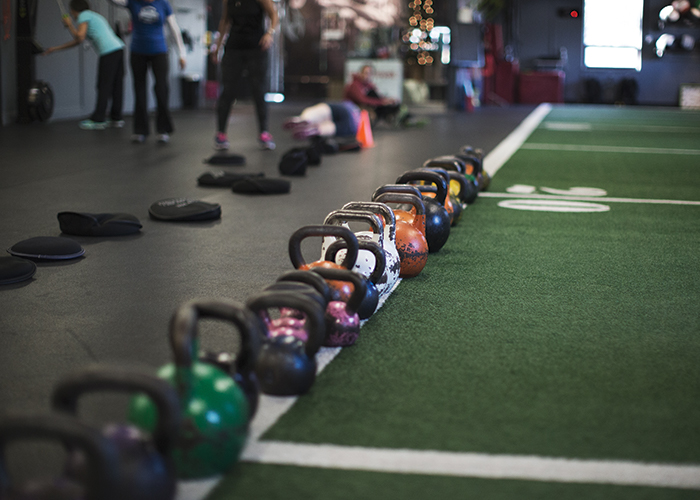Which Comes First – Cardio or Weights?
One question we receive over and over again is – should I start my workouts with weights or cardio? While the answer to this question can be complex, today’s post will offer some basic guidelines on how you can structure your individual workout sessions. Make sure you have your MYZONE heart rate chest strap on hand to count all those MEPs you'll be getting!
It is recommended that a comprehensive training program include both aerobic exercise and resistance training. For many of us, this means that we’ll need to get in some resistance training and some cardio within a ~1-hour workout session. So how do we structure that workout?
First, we encourage you to pick an exercise session structure that you will adhere to. If doing some resistance training before your cardio-focused group fitness class works best for you, do it! If you enjoy getting in a run before you focus on weights, go for it! For most of us with health and basic aesthetic goals (we want to be healthy and look in-shape), the order of cardio and weights matters less than simply doing our workouts and staying consistent with them.
That said, when we are selecting the ordering of cardio and resistance training within a workout, we should consider our training goals.
A simple rule to follow is to start your workout with the component of your fitness that you are most focused on or would like to improve the most. For instance, if you’re training for an endurance event, begin your workout with the endurance-focused exercise. This is because it is possible that the fatigue you experience after the first portion of your workout will impact your performance in the second half.
The Pro’s & Con’s of Each:
- Cardio First (Pro): Research has demonstrated that starting your workout with aerobic exercise may improve aerobic fitness (VO2max) to a greater extent than beginning with resistance training.
- Cardio First (Con): At the same time, this structure may decrease your strength and power improvements.
- Resistance Training First (Pro): This structure may offer greater gains in muscular hypertrophy, strength, and power, as well as increased fat oxidation in the subsequent cardio portion of the workout
- Resistance Training First (Con): Resistance training first may not increase VO2max to the same extent as performing cardio first.
Now that we understand how we might order our workouts, let’s explore how we can organize and schedule our workouts to maximize our results, gain MEPs with MYZONE's heart rate chest strap, and avoid excess fatigue and/or overtraining.

Focus on Different Muscle Groups Within a Workout:
This may decrease the muscular fatigue you would otherwise experience. An example is to perform upper-body resistance training, followed by lower-body cardio.

Vary the Intensity of the Components of Your Workout:
Some research has indicated that performing high-intensity cardio and resistance training within the same workout may compromise muscular strength and power. To avoid this, we recommend that you pair high-intensity cardio with lower-intensity resistance training, and higher-intensity resistance training with lower-intensity cardio.
Here’s how this might look when using your MYZONE belt:
- A high-intensity cardio, lower-intensity resistance training day:
- 5-10 min: Dynamic Warm-Up in the BLUE and GREEN zones
- 25 min: HIIT Training in the YELLOW or RED zones during the work phase and GREEN or BLUE zones during the recovery phase
- 5 min: Rest in the GRAY ZONE (see explanation below)
- 25 min: Resistance training using bodyweight or light resistance with a focus on muscular endurance in the BLUE or GREEN zones
- 5-10 min: Cool-down/Static Stretch in the GRAY, BLUE, or GREEN zones
- A high-intensity resistance training, lower-intensity cardio day:
- 5-10 min: Dynamic Warm-Up in the BLUE and GREEN zones
- 25 min: Resistance training using a weight that challenges you to the last rep (see this video about resistance training parameters & this video about how your heart rate may respond during resistance training)
- 5 min: Rest in the GRAY ZONE (see explanation below)
- 25 min: Steady-state endurance training in the BLUE or GREEN zones
- 5-10 min Cool-down/Static Stretch in the GRAY, BLUE, or GREEN zones

Limit Your Cardio & Resistance Training Days & Get Adequate Recovery:
A 2014 article in the ACSM Health & Fitness Journal states that concurrent training (cardio and resistance training within the same session) can be performed 3-4 times per week on nonconsecutive days (Kang & Ratamess, 2014). Notice that this mirrors the recommendation to allow each muscle group 48 hours of recovery between resistance training sessions. The article also suggests that we rest for 5-10 minutes between the resistance training and cardio portions of our workout.
With careful planning, it is possible to improve our cardiorespiratory and muscular fitness by training both within a single exercise session. If you’d like more guidance on how to structure your workouts, be sure to reach out to a personal trainer. Also, make sure you're wearing your MYZONE heart rate chest strap to keep track of the MEPs you earn!
If you have questions about this article, connect with us on MYZONE’s Facebook page, Instagram, and Twitter. Be sure to use the hashtags #myzonemoves and #effortrewarded.
For more tips on how to use MYZONE to achieve your fitness goals, follow us for our Fitness Friday broadcasts on Facebook Live (subscribe on MYZONE’s Facebook page) every Friday at 8 am PT, 11 am ET.
Keep moving forward!
References:
Kang, J., & Ratamess, N. (2014). Which comes first? Resistance before aerobic exercise or vice versa?. ACSM’S Health & Fitness Journal, 18(1), 9-14.
Share this
You May Also Like
These Related Stories

Understanding Supersets

Low Maintenance Cardio & Muscular Fitness Circuit



